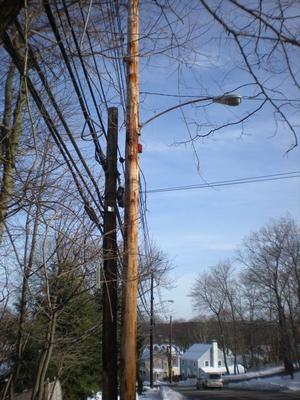
|
The fight against double poles leads to ‘muni’ examination
|

Courtesy photo
This double pole on Wildwood Street should have been removed five years ago, according to town officials.|
By Brad Petrishen/Staff Writer
GateHouse News Service
Posted Mar 06, 2010
Winchester, MA — Lexington Electric Utility Committee member Patrick Mehr, who in Winchester and other area towns is leading the fight against illegal double poles, is also taking on the electric companies whom he says take advantage of century-old legal wording to create monopolies.
The large investor-owned utilities (IOUs), such as NSTAR and Unitil, Mehr said, are given a “permanent monopoly” because of the obsolete laws, which he and the Massachusetts Alliance for Municipal Electric Choice are now working to reform.
The alternative to the IOU, Mehr said, are “munis” — municipal electric utilities — which, according to a recent report from the Massachusetts Department of Energy Resources (DOER), charge much less.
“Over the 2004 to 2008 period, municipal utility rates in Massachusetts have been substantially lower, on average, than IOU rates. … In 2008, the average system rate for municipal utilities was … about 21percent lower [than for IOUs],” DOER wrote.
“The DOER report basically confirms everything we have been saying for years,” said Mehr. “Munis charge less than IOUs, offer equivalent or better service than IOUs, provide for local control, charge less to everyone than the IOUs’ reduced low-income customer rates, pay equivalent PILOTs as IOUs pay in local taxes … have about 1% lower distribution losses than IOUs and promote energy efficiency and renewables.”
According to the Massachusetts Alliance for Municipal Choice Web site (|
www.massmunichoice.org
), in 2009 Unitil charged $102 per month for 500 kilowatt-hours of electricity, NSTAR charged $97 and the average Massachusetts muni charged $70.
Although 41 munis exist in the state, they were all started before the language of the laws became obsolete and barred any new munis from coming online, Mehr said.
Accordingly, his organization and many others have petitioned and succeeded in getting legislation that would correct the problem in the form of two bills (H3087 and S1527) currently in the legislature’s Joint Committee on Telecommunications, Utilities and Energy.
So far, the organizations garnered more than 2,200 signatures on a petition supporting the bills, and Mehr hopes that growing support will put pressure on legislators to open up the market. For more information or to sign the petition, visit
www.gopetition.com/petitions/municipal-choice.html




